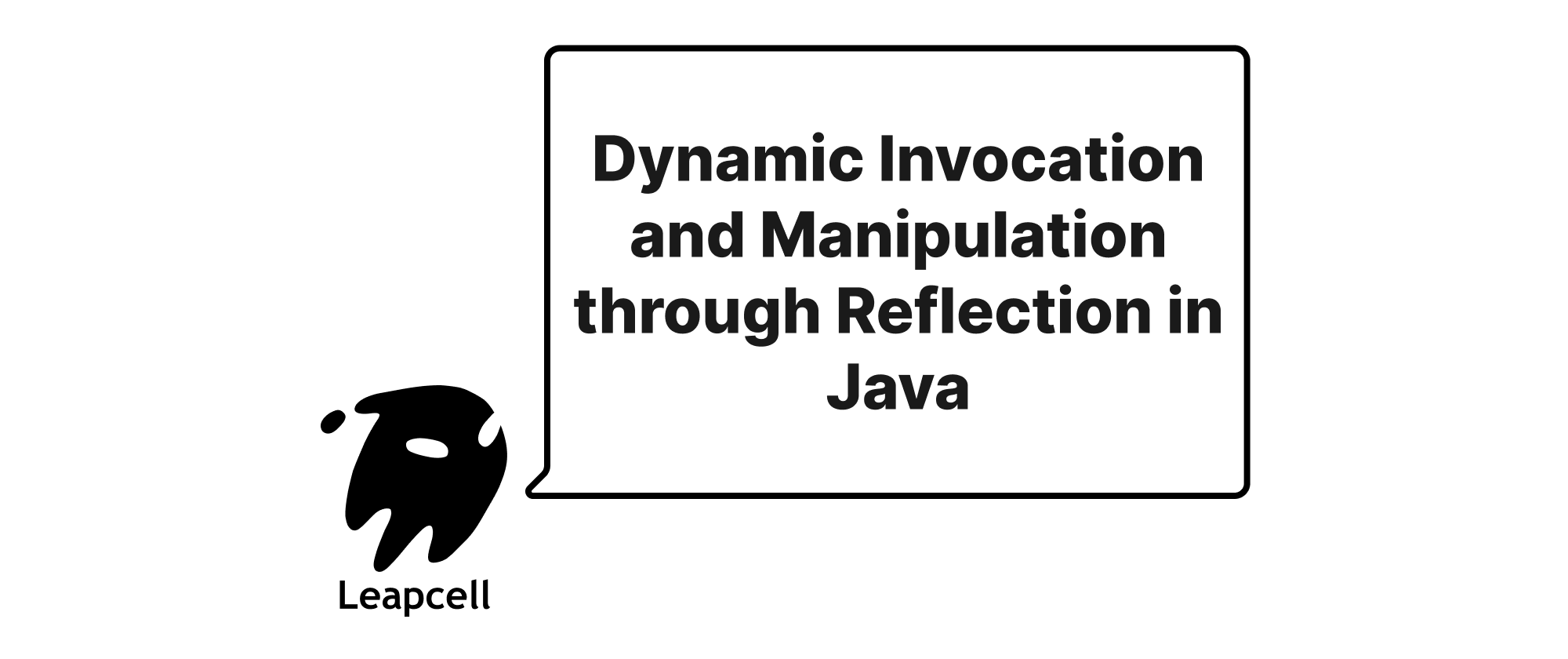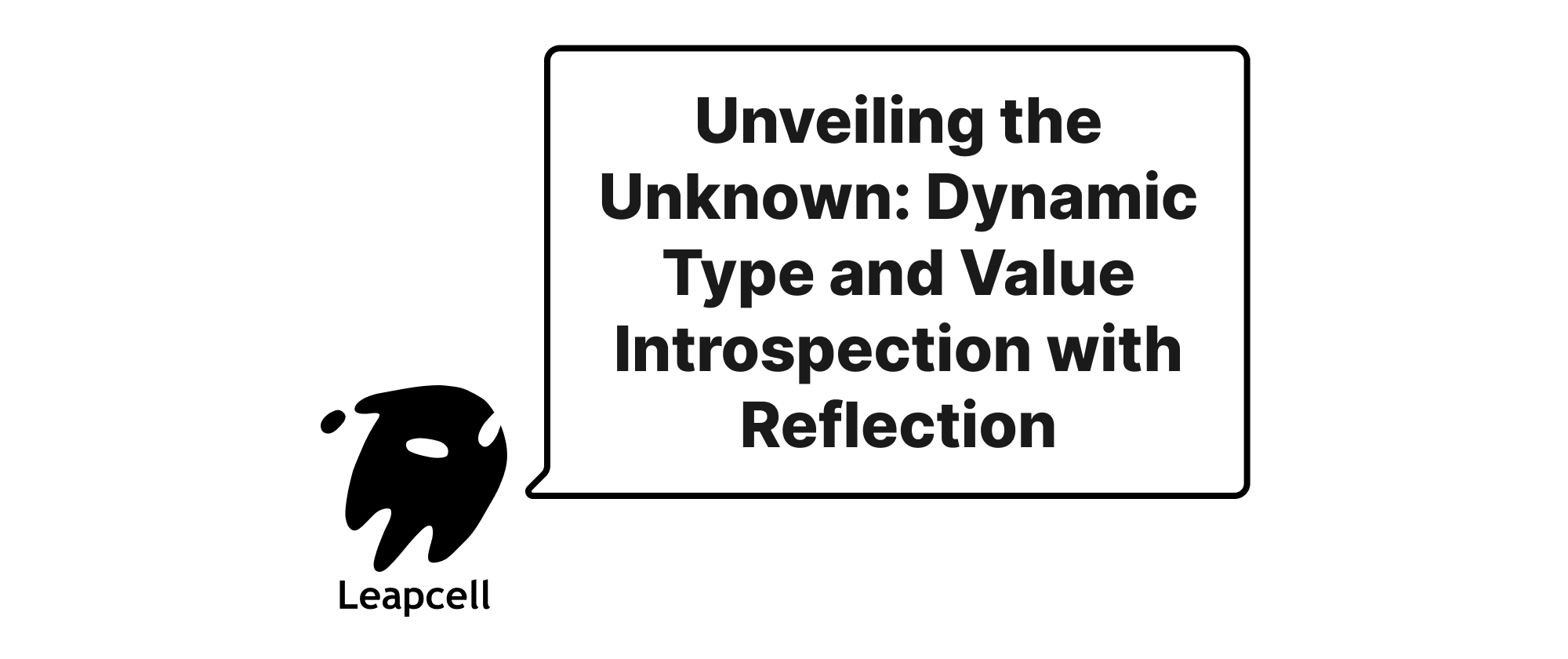Unleashing Reflection in Go: Dynamic Method Invocation and Value Manipulation
Grace Collins
Solutions Engineer · Leapcell

Go, known for its static typing and performance, might seem to shy away from dynamic programming paradigms. However, its built-in reflect package offers a powerful mechanism to inspect and manipulate types and values at runtime. This capability, often referred to as "reflection," allows for highly flexible and generic code, enabling dynamic method invocation and value modification.
While reflection can be a potent tool, it's crucial to understand its implications regarding performance and type safety. Generally, it should be used judiciously, primarily for scenarios where static typing is insufficient, such as serialization/deserialization, ORMs, dependency injection, or general-purpose data processors.
The reflect Package: The Gateway to Dynamism
The reflect package provides two core types: reflect.Type and reflect.Value.
-
reflect.Type: Represents the actual type of a Go value. You can obtain it usingreflect.TypeOf(). It provides information like the type's name, kind (e.g.,Struct,Int,Slice), methods, and fields. -
reflect.Value: Represents the runtime value of a Go variable. You can obtain it usingreflect.ValueOf(). It allows you to inspect and, if addressable, modify the underlying data.
Let's start with a simple example to illustrate how to get these:
package main import ( "fmt" "reflect" ) type User struct { Name string Age int City string } func (u *User) Greet() string { return fmt.Sprintf("Hello, my name is %s and I am from %s.", u.Name, u.City) } func main() { user := User{Name: "Alice", Age: 30, City: "New York"} // Get reflect.Type userType := reflect.TypeOf(user) fmt.Println("Type name:", userType.Name()) // Output: User fmt.Println("Type kind:", userType.Kind()) // Output: struct // Get reflect.Value userValue := reflect.ValueOf(user) fmt.Println("Value kind:", userValue.Kind()) // Output: struct fmt.Println("Is zero value:", userValue.IsZero()) // Output: false // Accessing fields by reflection (read-only for non-addressable values) nameField := userValue.FieldByName("Name") if nameField.IsValid() { fmt.Println("User name (reflect):", nameField.String()) // Output: Alice } ageField := userValue.FieldByName("Age") if ageField.IsValid() { fmt.Println("User age (reflect):", ageField.Int()) // Output: 30 } }
Dynamic Method Invocation
One of the most powerful features of reflection is the ability to call methods dynamically. To do this, you first need to obtain the reflect.Value of the method you want to invoke.
Steps for Dynamic Method Invocation:
- Get
reflect.Valueof the target object: This must be an addressable value if the method needs to modify the receiver (i.e., you should pass a pointer toreflect.ValueOf()). - Find the methodByName: Use
Value.MethodByName(name string)to get thereflect.Valuerepresenting the method. - Check if the method exists and is valid:
reflect.Valuefor a non-existent method will be invalid. - Prepare arguments: Create a slice of
reflect.Valuefor each argument the method expects. - Call the method: Use
Value.Call(in []reflect.Value)to invoke the method with the prepared arguments. It returns a slice ofreflect.Valuecontaining the method's return values.
Let's extend our User example to call the Greet method dynamically.
package main import ( "fmt" "reflect" ) type User struct { Name string Age int City string } func (u *User) Greet() string { return fmt.Sprintf("Hello, my name is %s and I am from %s.", u.Name, u.City) } func (u *User) SetAge(newAge int) { u.Age = newAge } func main() { user := &User{Name: "Bob", Age: 25, City: "London"} // Note: user is a pointer to make it addressable // 1. Get reflect.Value of the target object (needs to be addressable for method calls that modify receiver) userValue := reflect.ValueOf(user) // 2. Find the Greet method greetMethod := userValue.MethodByName("Greet") // 3. Check if the method exists and is valid if greetMethod.IsValid() { // 4. Prepare arguments (Greet takes no arguments, so an empty slice) var args []reflect.Value // 5. Call the method results := greetMethod.Call(args) // Process results if len(results) > 0 { fmt.Println("Greet method output:", results[0].String()) // Output: Hello, my name is Bob and I am from London. } } else { fmt.Println("Greet method not found.") } // Example with a method that takes arguments setAgeMethod := userValue.MethodByName("SetAge") if setAgeMethod.IsValid() { // Prepare arguments: a single reflect.Value for newAge newAgeVal := reflect.ValueOf(35) setAgeMethod.Call([]reflect.Value{newAgeVal}) fmt.Println("User age after SetAge (reflect):", user.Age) // Output: 35 // Verify using reflection directly fmt.Println("User age value after SetAge (reflect value):", userValue.Elem().FieldByName("Age").Int()) // Output: 35 } else { fmt.Println("SetAge method not found.") } }
Notice the crucial detail: when calling methods that modify the receiver (like SetAge), you must pass a pointer to the reflect.ValueOf(). This makes the underlying value addressable. If you pass a non-pointer User{...}, reflect.ValueOf() will create a copy, and any modifications to that copy will not affect the original variable.
userValue.Elem() is used to get the reflect.Value that the pointer userValue points to. This allows us to access and modify the fields of the underlying User struct.
Modifying Values Dynamically
To modify a value using reflection, the reflect.Value must be addressable. This means it represents a variable that can be assigned to. You can check addressability with Value.CanSet(). If CanSet() returns true, then you can use methods like SetString(), SetInt(), SetFloat(), SetBool(), Set(), etc.
How do you get an addressable reflect.Value?
-
Start with a pointer: If you pass a pointer to
reflect.ValueOf(), the resultingreflect.Valuewill point to the original variable. You can then useValue.Elem()to get the addressablereflect.Valueof the element the pointer points to. -
Field of an addressable struct: If you have an addressable
reflect.Valueof a struct, its exported fields will also be addressable.
package main import ( "fmt" "reflect" ) type Product struct { Name string Price float64 SKU string // Exported cost float64 // Not exported } func main() { p := &Product{Name: "Laptop", Price: 1200.0, SKU: "LP-001", cost: 900.0} // Get reflect.Value of the pointer to Product productValPtr := reflect.ValueOf(p) // Get the reflect.Value of the Product struct itself (p.Elem() is addressable) productVal := productValPtr.Elem() // Modify exported fields nameField := productVal.FieldByName("Name") if nameField.IsValid() && nameField.CanSet() { nameField.SetString("Gaming Laptop") fmt.Println("Product Name after modification:", p.Name) // Output: Gaming Laptop } else { fmt.Println("Name field not found or not settable.") } priceField := productVal.FieldByName("Price") if priceField.IsValid() && priceField.CanSet() { priceField.SetFloat(1500.0) fmt.Println("Product Price after modification:", p.Price) // Output: 1500 } else { fmt.Println("Price field not found or not settable.") } // Attempt to modify an unexported field (will fail CanSet()) costField := productVal.FieldByName("cost") if costField.IsValid() && costField.CanSet() { costField.SetFloat(1000.0) // This line will not be reached fmt.Println("Product Cost after modification:", p.cost) } else { fmt.Println("Cost field not found or not settable (likely unexported).") // Output: Cost field not found or not settable (likely unexported). } // Dynamic assignment using Set() for arbitrary types num := 10 numVal := reflect.ValueOf(&num).Elem() // Get addressable reflect.Value of num if numVal.CanSet() { numVal.Set(reflect.ValueOf(20)) fmt.Println("Num after dynamic set:", num) // Output: 20 } }
Important considerations for modifying values:
- Addressability (
CanSet()): Only addressablereflect.Values can be modified. - Exported Fields: Only exported (capitalized in Go) struct fields can be modified through reflection when accessing them by
FieldByName(). This is a crucial security and encapsulation measure. Unexported fields are not settable externally through reflection unless you obtain the fieldreflect.Valuein a more "unsafe" way (e.g., usingreflect.ValueOf(nil).UnsafeAddr()directly, which is generally discouraged and beyond the scope of typical reflection use). - Type Compatibility: When setting a value, the type of the value you're setting must be assignable to the type of the target
reflect.Value. For instance, you can'tSetString()on anintfield.
Practical Examples and Use Cases
1. Generic Data Processor
Imagine you have a common Process function that needs to iterate over the fields of different structs and apply some logic (e.g., validation, logging, data transformation).
package main import ( "errors" "fmt" "reflect" ) type Config struct { LogLevel string `json:"logLevel"` MaxConnections int `json:"maxConnections"` DatabaseURL string `json:"databaseUrl"` } type UserProfile struct { Username string Email string IsActive bool } // ProcessFields iterates over the exported fields of a struct and applies a function. // The structPtr should be a pointer to the struct. func ProcessFields(structPtr interface{}, handler func(fieldName string, fieldValue reflect.Value) error) error { val := reflect.ValueOf(structPtr) if val.Kind() != reflect.Ptr || val.IsNil() { return errors.New("ProcessFields expects a non-nil pointer to a struct") } elem := val.Elem() if elem.Kind() != reflect.Struct { return errors.New("ProcessFields expects a pointer to a struct") } typ := elem.Type() for i := 0; i < typ.NumField(); i++ { field := typ.Field(i) fieldValue := elem.Field(i) // Get the reflect.Value for the current field // Only process exported fields if field.IsExported() { fmt.Printf("Processing field: %s (Type: %s, Kind: %s, Settable: %t)\n", field.Name, field.Type.Name(), fieldValue.Kind(), fieldValue.CanSet()) if err := handler(field.Name, fieldValue); err != nil { return fmt.Errorf("error processing field %s: %w", field.Name, err) } } } return nil } func main() { config := &Config{ LogLevel: "INFO", MaxConnections: 100, DatabaseURL: "postgres://user:pass@host:5432/db", } fmt.Println("--- Processing Config ---") err := ProcessFields(config, func(fieldName string, fieldValue reflect.Value) error { switch fieldValue.Kind() { case reflect.String: fmt.Printf(" String field '%s': '%s'\n", fieldName, fieldValue.String()) case reflect.Int: fmt.Printf(" Int field '%s': %d\n", fieldName, fieldValue.Int()) if fieldName == "MaxConnections" && fieldValue.Int() < 10 { fmt.Println(" Warning: MaxConnections is very low!") } } return nil }) if err != nil { fmt.Println("Error:", err) } userProfile := &UserProfile{ Username: "john_doe", Email: "john@example.com", IsActive: true, } fmt.Println("\n--- Processing UserProfile ---") err = ProcessFields(userProfile, func(fieldName string, fieldValue reflect.Value) error { if fieldValue.Kind() == reflect.String && fieldName == "Username" { if fieldValue.String() == "" { return errors.New("username cannot be empty") } // Example of modification: convert username to uppercase if fieldValue.CanSet() { fieldValue.SetString(fieldValue.String() + "_PROCESSED") } } fmt.Printf(" Generic handler for '%s': Value is %v\n", fieldName, fieldValue.Interface()) return nil }) if err != nil { fmt.Println("Error:", err) } fmt.Println("UserProfile after processing:", userProfile) // Output: UserProfile after processing: &{john_doe_PROCESSED john@example.com true} }
2. Simple ORM/Mapper (Conceptual)
Reflection is the backbone of many ORMs and data mappers, allowing them to map database rows to struct fields without explicit per-model coding.
package main import ( "fmt" "reflect" "strings" ) // Simplified database row (map[string]interface{} for dynamic columns) type DBRow map[string]interface{} // MapRowToStruct maps a DBRow to a struct instance. // It assumes structFieldNames map exactly to row map keys (or a naming convention). func MapRowToStruct(row DBRow, target interface{}) error { // target must be a pointer to a struct val := reflect.ValueOf(target) if val.Kind() != reflect.Ptr || val.IsNil() { return fmt.Errorf("target must be a non-nil pointer") } elem := val.Elem() if elem.Kind() != reflect.Struct { return fmt.Errorf("target must be a pointer to a struct") } typ := elem.Type() for i := 0; i < typ.NumField(); i++ { field := typ.Field(i) fieldValue := elem.Field(i) // Check if field is exported and settable if field.IsExported() && fieldValue.CanSet() { // Get column name (simple: lowercase field name, or use struct tags) columnName := strings.ToLower(field.Name) if jsonTag, ok := field.Tag.Lookup("json"); ok { // Use json tag if available (common for ORMs to use custom tags) // Remove ",omitempty" or other options columnName = strings.Split(jsonTag, ",")[0] } if rowValue, ok := row[columnName]; ok { // Convert rowValue to reflect.Value srcVal := reflect.ValueOf(rowValue) // Check if types are assignable if srcVal.Type().AssignableTo(fieldValue.Type()) { fieldValue.Set(srcVal) } else { // Handle type conversion (e.g., int64 from DB to int struct field) // This is a simplified example; real ORMs have robust type conversion. fmt.Printf("Warning: Type mismatch for field '%s'. Expected %s, got %s. Attempting conversion...\n", field.Name, fieldValue.Type(), srcVal.Type()) if fieldValue.Kind() == reflect.Int && srcVal.Kind() == reflect.Int64 { fieldValue.SetInt(srcVal.Int()) } else if fieldValue.Kind() == reflect.Float64 && srcVal.Kind() == reflect.Float32 { fieldValue.SetFloat(srcVal.Float()) } else if fieldValue.Kind() == reflect.String && srcVal.Kind() == reflect.Bytes { fieldValue.SetString(string(srcVal.Bytes())) } else { return fmt.Errorf("unsupported type conversion for field '%s' from %s to %s", field.Name, srcVal.Type(), fieldValue.Type()) } } } } } return nil } type Product struct { ID int `json:"id"` Name string `json:"product_name"` Price float64 `json:"price"` InStock bool `json:"in_stock"` } func main() { dbRow := DBRow{ "id": 101, "product_name": "Go Book", "price": 39.99, "in_stock": true, "description": "A very useful book about Go.", // Extra field in row } product := &Product{} // Pointer to a new Product err := MapRowToStruct(dbRow, product) if err != nil { fmt.Println("Error mapping row:", err) return } fmt.Printf("Mapped Product: %+v\n", product) // Output: Mapped Product: &{ID:101 Name:Go Book Price:39.99 InStock:true} }
Performance and Pitfalls of Reflection
While powerful, reflection comes with overhead:
- Performance: Reflection is significantly slower than direct type-safe operations. Each reflective operation involves runtime type checks, memory allocation, and conversion, which are skipped in statically compiled code. For hot code paths or heavy data processing, avoid reflection if possible.
- Type Safety Loss: Reflection bypasses Go's static type checking at compile time. Type mismatches or non-existent fields/methods will lead to runtime panics (e.g., if you try to
SetInton a string field, or callMethodByNameon a method that doesn't exist without checkingIsValid()). Robust error handling is crucial. - Code Readability: Code relying heavily on reflection can be harder to read and reason about because the types and operations are not explicit upfront.
- Refactoring Challenges: When you rename a field or method, reflection-based code that refers to it by string name will break at runtime, not compile time.
When to Use Reflection (and when not to):
💪 Use Reflection For:
- Serialization/Deserialization: JSON, XML, Protobuf encoders/decoders use reflection to map data to Go structs.
- ORM/Data Mapping: Mapping database rows to Go structs, abstracting database-specific logic.
- Dependency Injection Frameworks: Dynamically injecting dependencies into structs.
- Testing Utilities: Generating test data or mocking interfaces.
- Generic Utilities: Building tools that work with arbitrary Go types without knowing them at compile time (e.g., deep cloning, diffing).
- Plugins/Extensibility: Loading and interacting with modules at runtime whose types aren't known beforehand.
🚫 Avoid Reflection For:
- Basic Field Access/Modification: If you know the type at compile time, use
obj.Field = value. - Direct Method Calls: If the method is known, use
obj.Method(args). - Performance-Critical Code: Unless the dynamic behavior is an absolute requirement, the performance overhead often outweighs the flexibility.
Conclusion
Go's reflect package is a sophisticated tool that bridges the gap between Go's static nature and the need for dynamic runtime behavior. Understanding reflect.Type and reflect.Value, along with concepts like addressability, CanSet(), and Elem(), is fundamental. While it enables powerful generic programming scenarios and is essential for many standard library features, its use should be deliberate and weighed against performance and type safety considerations. When applied appropriately, reflection can unlock remarkable flexibility, allowing you to write Go applications that adapt and respond to data structures and methods at runtime.


